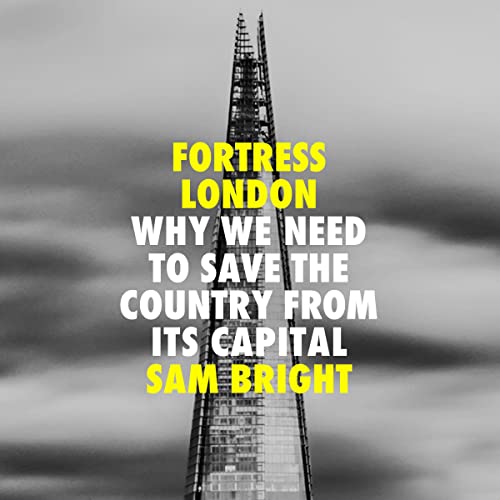Fortress London: Why we need to save the country from its capital by Sam Bright review

When I began reading this book on the train to Cambridge from Leeds to visit a college friend at University there, I was surprised, and proud, to find that Sam Bright had gone to the same college for A-Levels as me, several years before. The fact that my first response was surprise, almost the the point of being shocked, that a young journalist who has just published his first book could have gone to the same state sixth form college in Huddersfield as me, rather than having been brought up in London or the South East (and probably also having gone to a private school), captures much of the argument, and the power, of Bright's book. From then on I was gripped by his compelling explanation of why.
Fortress London: Why we need to save the country from its capital by Sam Bright portrays in writing, fact and figures the daily life that populations outside of London face in their education, health, employment, opportunities, politics, leisure and more, but simultaneously makes a robust case of solidarity with those who aren’t the middle class and super rich in London. These communities in London are often painted with the same scathing brush by outsiders yet face similar struggles of poverty, inequality and dis-advantage to people living in parts of the country beyond the middle class “fortress”.
Timely, thorough and constructed on foundations of dismay and anger but offering hope and solutions for the future Fortress London explores an inequality entrenched by hundreds of years of public policy, but an issue that is creeping to be addressed by high politics.
Although the first chapter applies the classic New Labour slogan ‘Education, Education, Education’, it was my favourite for its structured use of data, personal experience, interviews and setting the scene for the rest of the book. This chapter challenges those who believe in the idea of a market of meritocracy, and education being the great leveller for opportunity. It is in this chapter that Bright identifies and explains that the problem of London being a ‘Fortress’,inaccessible to the rest of the country, is more than just a geographical issue, but an issue that is compounded education inequality.
The chapter continues and platforms the case study of the ‘London Schools Challenge’, utilised by the New Labour governments to raise the standard of schools in London, a project which has been heralded as a success for education standards. But it has resulted in a massive divide in the social demographics that make up these schools, an increased divide in the education outcomes of students in London and out of London, and solidifying positive opportunity for a new group of London educated populations. No longer must middle class parents in London supposedly scrimp and save to send their children to private schools, as instead they can get the best standards of state education, without the fees, and similar social network opportunities for their children. But this hasn’t been translated to the other regions of England.
In Bright’s assessment the impact made by the education divide, reinforces the concentration of employment opportunities in London and the South East, specifically when considering jobs that have access to power.
Speaking of his own experiences in journalism, as an early career journalist at the BBC, Bright writes about the difficulty of getting access to jobs in journalism if you don’t have the connections, and then describes the difficulty of being able to accept the role due to the precarity of trying to set up life in London. Bright rented airBnBs in London through the week and travelled home to West Yorkshire on a Friday, ready to go back to London on a Monday. This was a difficulty that wasn’t appreciated or considered by the majority of his managers and senior staff at the BBC. Bright uses this to question why should people have to be uprooted from their home and their communities in search of opportunity and following ambition, all because certain elite industries are contained to London.
This difficulty of location is caused by the concentration of industries such as the arts, media, politics, law, finance and more within London. These are overwhelmingly Jobs that dictate the national conversation, how we all live and participate in society and locking them within London is bad for those outside and damaging for those within the industries. In sectors which are already steeped in elitism, geographic immobility worsens chances for those who aim to access these professions.
Theorising on this Bright goes so far as to suggest that geographic location should be considered in tandem with other demographics when employment processes and the like take place. But he repeatedly stresses that it is not equal with the oppression that comes along with identities such as race, gender, sexuality and so on. In his ‘Sheffield City Council Annual Marx Lecture’ sociologist Stuart Hall partially touches on the interaction between geography and class on life outcomes and opportunities, whilst intersecting them with race, gender, education and more. Hence Bright’s suggestion is not overly new, but an adoption of previous ideas into a practical use, and platforming geographical situation as a demographic to consider.
Bright enthusiastically hypothesises that Parliament could move around the country, and with the movement of the centre of power, journalists, think tanks, consultants and many aligned elite industries would move too. He imagines the impact that Parliament settling in Exeter, York, Aberdeen, Norwich, Lancaster, Swansea for three years a piece could have. And with Parliament up for a shockingly costly refurbishment, it is a topical suggestion that could be taken further.
Whilst the proposal for a roving parliament might seem an outlandish suggestion, it illustrates the benefits of greater devolution in England, with regional assemblies or parliaments with the similar powers to those of Scotland, Wales and Northern Ireland. Bright repeatedly uses Germany as an example of a high productivity and successfully decentralised country, with powerful and strong regional governments. He suggests that adopting their model may be a step to curing our ills of inequality and unproductivity, whilst also providing opportunity for the spread of sectors that are centred around politics, and a reduction in the addiction to London that power in the United Kingdom has.
As with any professional under 35 in the UK at the moment, unaffordable and unstable housing formed a considerable focus of Fortress London and Bright’s assessment of the dire conditions of London housing intertwines with the inaccessibility of opportunities in London. But also the money being held by those who bought property in London before the housing market going out of control, the retired, the landlords and the middle classes holding so much wealth that will not trickle down to benefit others.
Housing is intertwined with access to opportunities. Entry level roles don’t pay high enough wages to sustain living a comfortable life in London and increasingly many other urban centres. A struggle that is faced by those from outside of London looking to come in, and faced to a harsher extent by those born, raised or already calling London home. Getting into these elite professions, and then progressing within them requires a stable place to live, and affordable place. Hence those who already live within London, and have space to live with family in the early career years are able to apply for and accept job offers without the stress and struggle of moving out. A point that the Centre for London argues is supportive of London as a social mobility ‘hot spot’ for those who already live in London.
When considering the impact of recent and contemporary politics on the North South divide, Bright scalds the Corbyn Labour party for having a ‘London-centric’ senior team, with four of their top shadow cabinet posts all being within London. Bright regularly refers to Hatherley’s ‘Red Metropolis’ to identify the former Labour Leader and his direction of leadership as too London focused, and alienating. I would dispute this point, due to the plethora of policies that Labour under Corbyn had to re-distribute wealth and opportunity across the country, and not just a measly ‘levelling up’. From regional investment banks, free nationalised broadband, the green Industrial Revolution to bring jobs to de-industrialised areas, investing in and nationalising the railways, which if run for the public not profit could assist in unlocking productivity currently neutered by a failing franchise system, to name a few re-distributive policies.
I don’t see the same vision from the current Labour Party, who at the time of writing had two of the shadow great offices of state representing constituencies from West Yorkshire, and the other two constituencies in London. In addition, the two West Yorkshire MPs, were ‘parachuted’ in and had little connection to their areas before standing. This reverses the dynamic that many go to London to seek opportunities in politics, but to reach certain ambitions such as political office a person has to find a safe seat outside London and set up life elsewhere in the hope of getting elected. With this ensues a balancing act between the place a politician represents, and their political duties in London, causing personal turmoil of family life, schooling of children, internal issues of impostor syndrome and so on.
On Brexit and the Red Wall, Bright wrote some of his more compelling and focused chapters. He brings together a cornucopia of facts, figures and arguments to convey the demonisation of Leave-voting places by the Remain-supporting media to a large extent. Pointing out that London and Yorkshire and Humber both had the same amount of Leave voters, but only one was for it, and tarred with the brush for that.
Bright associates the failure of Labour in 2019 with agitations in the Red Wall against centralised urban centres, not so much a focus on London but a neglect of areas that were not deemed as useful for growth, or a productive part of the ‘post-industrial, technological, university-educated economy’. I partially deviate from Bright’s assessment here due to other factors causing the loss for Labour in 2019 primarily misinformation from right wing media, which disguised the negative consequences of the policy of austerity. Brexit was caused partly by centralisation, but I would take the position that it was more a response against an establishment politics whose offer of an alternative was not good enough.
Bright moves the focus to devolution and the increasing power and influence that accompanies new powers. He seems hopeful of transforming the North within the current state and calls for greater devolution to demolish Fortress London. Only through allowing regional issues to be addressed and administered by local power and leaders would suitable, effective and happy solutions be found. Bright praises the work of some metro mayors in becoming identifiable figures, some with policy and vision that marks them out from the hegemonic identity of Westminster.
When considering the response of the British Government to the Covid-19 Pandemic, Bright builds on criticism of others that policy and response were too centralised, causing decisions to be ineffective as a result. He emphasises the ability of devolved leaders such as Nicola Sturgeon, Mark Drakeford and Andy Burnham to make some of their own decisions to respond to the pandemic, and so to fortify their own positions and the power of devolution. The response to the pandemic conveyed to the nation the crisis of asymmetrical devolution, whilst demonstrating the great power devolved leaders can wield.
Bright finishes on unification a conclusion fitting for the divisive framework that the title pushes, but is fearful of what further inequality and lack of action on this could mean for the state of government, the state of the social fabric and opportunity for all within the country.
Book Review: The Rentier City by Isaac Rose reviewed by James Fishwick
The Rentier City - Manchester and the making of the Neoliberal Metropolis by Isaac Rose is a more than thorough history of the industrialisation of Manchester …
Side-by-Side Comparison of West Yorkshire Mayoral Candidates' Ideas
We've put together a side-by-side comparison of the ideas and pledges of Tracy Brabin, Bob Buxton, Andrew Cooper, Stewart Golton and Matthew Robinson, the main …
What could devolution mean for us?
In December 2014, people living in East Leeds explored what devolution could mean for them during a special programme on community radio station, Chapel FM …

